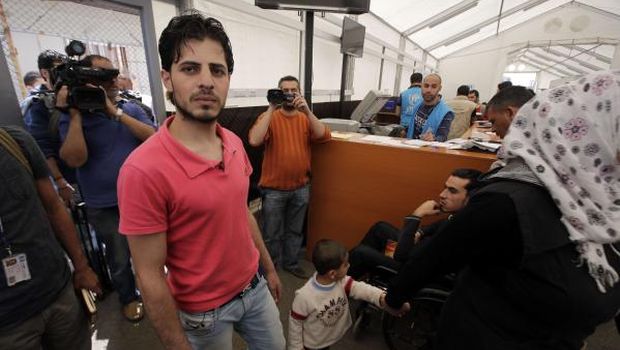
Yehia, left, the millionth Syrian refugee in Lebanon, arrives to register at a UNHCR registration center, after fleeing from Yabrud, in the northern port city of Tripoli on April 3, 2014. (AFP Photo/Joseph Eid)
Beirut, Asharq Al-Awsat—The Lebanese government will be taking steps to control the flow of Syrian refugees into the country in the coming days, Minister of Social Affairs Rashid Darbas told Asharq Al-Awsat on Saturday.
Darbas said the government would strengthen humanitarian measures to help refugees, but would clamp down on “economic migration,” which he said was having a severe negative impact on the incomes of Lebanese workers.
The minister told Asharq Al-Awsat that a meeting of the committee in charge of this issue will be held on Thursday, and that he expected important decisions to be made.
Darbas announced a ban on building camps without prior permission, saying that the number of unregulated refugee camps now exceeded 1,000. He added that there was a consensus in Lebanon to press the international community to build camps in ‘safe zones’ inside Syria, or on the country’s borders.
In an attempt to regulate the entry of refugees, the Lebanese government has recently started implementing a stricter policy of monitoring arrivals from Syria.
The Interior Ministry last week imposed specific criteria for the entry of Palestinians into Lebanon, following the deportation of 49 people from Beirut’s Rafiq Hariri International Airport because they were in possession of forged visas to enter Libya.
The United Nations Higher Commission for Refugees (UNHCR), meanwhile, announced that the number of Syrian refugees in Lebanon was now more than 1 million, compared to a pre-war Lebanese population of just over 4 million.
UNHCR spokeswoman in Lebanon, Joelle Eid, said that following the unprecedented increase in the number of refugees the UNHCR had concluded that the building of additional refugee camps was necessary, but still needed a political decision from the Lebanese government.
Eid told Asharq Al-Awsat the UNHCR, along with the Ministry of Social Affairs, had carried out a number of studies on possible sites for new camps, mostly in the Beqaa Valley and the north.
Eid said that Darbas’ suggestion for new camps inside Syria and reception centers on the Syrian–Lebanese borders would not receive UNHCR support, because their proximity to Syria might place the refugees in danger.
The IMF published a report on the Lebanese economy on Friday, predicting it would grow by 2 percent in 2014, and 4 percent in the medium term.
It warned however that “the crisis in Syria [had] led to an unprecedented flood of refugees who are currently estimated to number a quarter of the population, which has also adversely affected the security situation and exhausted local communities.”
The IMF statement added that Lebanon needed more than the 800 million US dollars in aid it received from international donors in 2013 to cope with the growing cost of the Syrian refugees within its borders.
